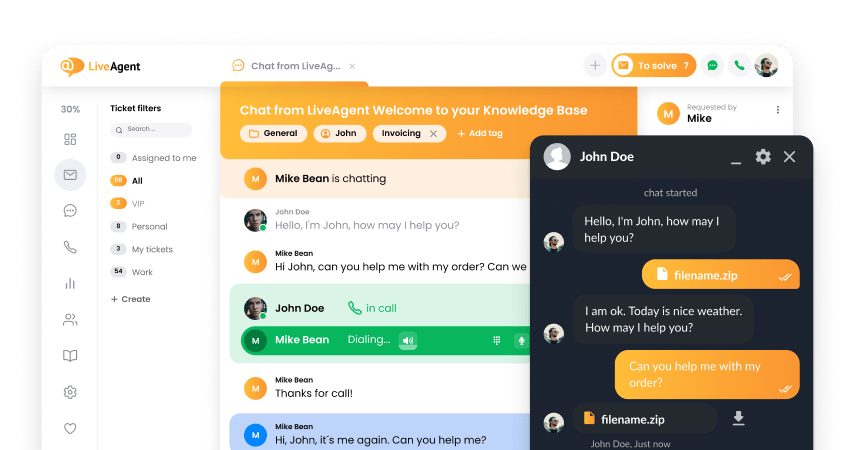A complete guide to the best Jira alternatives
Jira is an intuitive project management tool developed by Atlassian, known for its extensive features that help streamline various aspects of customer service. However, it’s always good to explore other alternatives available on the market.
Let’s dive into some of the other available options to ensure that you find the most suitable solution for your customer service team.
Why should you look for Jira alternatives?
By exploring tools similar to Jira, there is a high chance you find a solution that better aligns with your organization’s customer service requirements, improves your team’s efficiency, and fits your budget. When you are looking for Jira alternatives, consider these aspects:
- Customization: Jira offers a high level of customization to suit your organization’s unique needs. However, setting it up might be time-consuming and may require a level of technical expertise.
- Cost: Make sure you compare prices that the other providers offer to get the best value for your money. Some of the Jira alternatives may offer similar features and functionalities at a more affordable price, which will help you be more cost-effective. Additionally, there are free Jira alternatives available on the market.
- User experience: Jira software is known for its comprehensive set of features, which can be overwhelming for some users. Its complexity may result in a steep learning curve, causing delays in addressing issues efficiently. All this can lead to negative user experiences and become a reason to look for software alternatives to Jira.
- Features: Some Jira alternatives are specifically designed for customer service, offering powerful features such as ticketing system, live chat, or knowledge base management that will directly meet the needs of a customer support team.
- Integration: Integration is another important aspect worth considering. Jira may not be able to integrate with all the other tools that your team uses on a daily basis. In such cases, consider alternatives that will offer better integration options for increased team efficiency.
How to find the perfect Jira alternative for your business
If you’re looking for an alternative to Jira that can better meet your organization’s needs, there are several aspects you should take into consideration. By taking these into account, you can choose the best option for your business.
Clarify your objectives and expectations
Finding the perfect tool for your business is essential to maximize efficiency and productivity in your organization. To do this, it’s important to clarify your objectives and expectations.
- Assess your needs: Before you start exploring any available options, it’s crucial to clearly understand your business needs. Consider your team size, the complexity of your projects, and the specific features you require in a project management tool.
- Identify your must-have features: Create a list of essential features you need in an intuitive project management tool and customer service platform. These features may include task management, time tracking, reporting, or collaboration tools.
- Ease of use: For a project management solution to be effective, it must be user-friendly and intuitive. Look for a simple user interface, easy navigation, and a minimal learning curve; it will help your team adapt to the new platform quickly..
- Scalability: As your business grows, your needs and requirements will also evolve. Select a tool that can scale with your business, offering additional features, user licenses, and support as needed.
Analyze features and customization
Take a look at the set of features offered by the alternative software, and how well those features align with your business needs.
To give you an idea, take a look at Jira’s Reports and Insights feature and compare it with LiveAgent’s analytics feature.
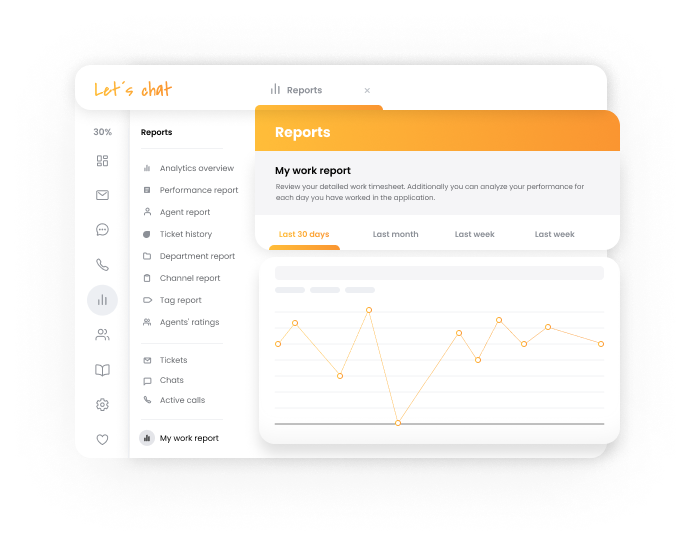
Another is the level of customization. Your business has its unique needs and requirements, so it’s important to choose software that allows flexibility and customization to meet those needs.
Balance cost and functionality
You should always aim for a balance between cost and functionality. Make sure that what you get from the particular provider is worth the money and that you don’t have to sacrifice important features and capabilities in exchange for cost savings. Fortunately, many providers on the market offer similar functionality at a more affordable price, or there are also many free alternatives to Jira software that can offer you enough to meet your expectations.
Analyze user reviews and testimonials
One of the best ways to evaluate different options is by analyzing user reviews and testimonials. They can provide valuable insights into the experiences of real users which can help you identify the strengths and weaknesses of each option.
While you are going through the customer reviews, it is important to look for patterns. Are there common issues reported by multiple users? Are there certain features that users seem to enjoy? By identifying these patterns, you can get a better understanding of how the software performs in different scenarios. However, don’t rely on one source. Instead, take time to read a variety of reviews from different sources.
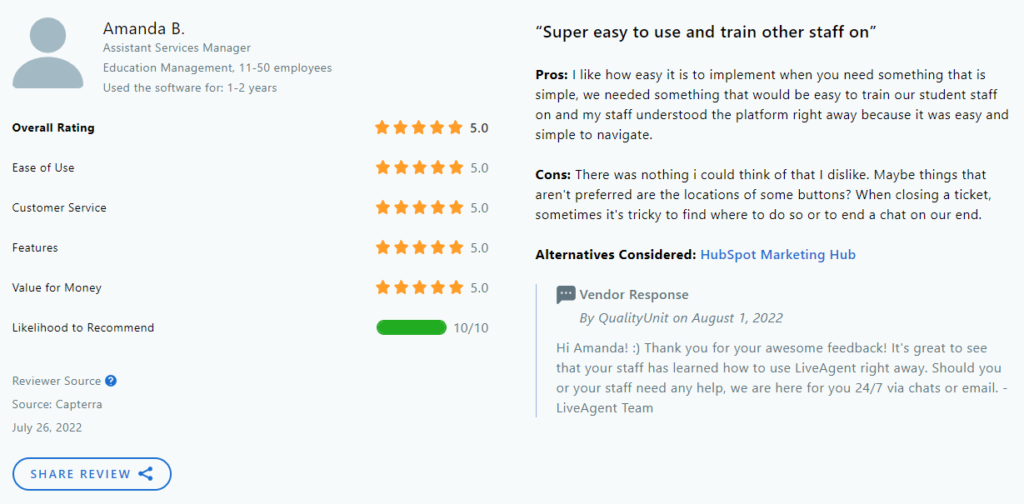
Examine customer support and resources offered by Jira competition
When evaluating customer support offered by Jira alternatives, there are some key factors worth considering. First of all, you want to look for a software provider that offers a variety of support channels, such as email, and live chat, as well as an online knowledge base.
You also want to evaluate customer support quality levels. Are the support representatives helpful? Are the resources easy to understand? How easy is it to contact customer service representatives? What is the average resolution time?
By carefully evaluating software providers’ customer support and resources, you can find the perfect solution for your business. Throw in the added benefit of excellent customer support, and you may have the Jira alternative of your dreams.
LiveAgent offers its customers best customer support thanks to its live chat support and extensive knowledge base accessible to everyone from anywhere. There, you can find a variety of helpful articles, video tutorials, answers to commonly asked questions, and much more.
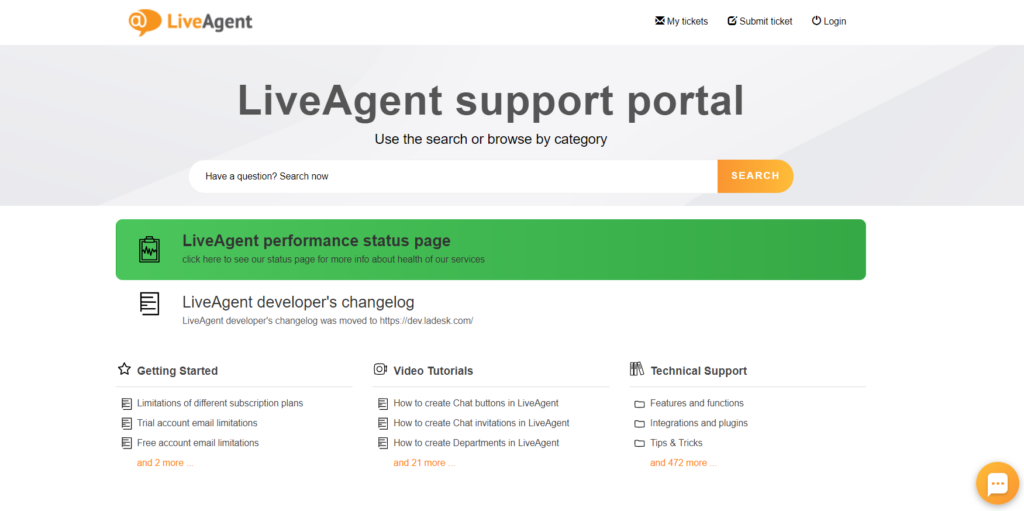
The 15 best Jira alternatives
1. LiveAgent
LiveAgent stands out from other Jira alternatives by offering a comprehensive customer support solution that includes not only project management features, but also help desk software, reliable live chat solutions, and social media integration. Additionally, it offers an intuitive interface, customizable ticket statuses, and automation features that streamline processes and boost productivity.
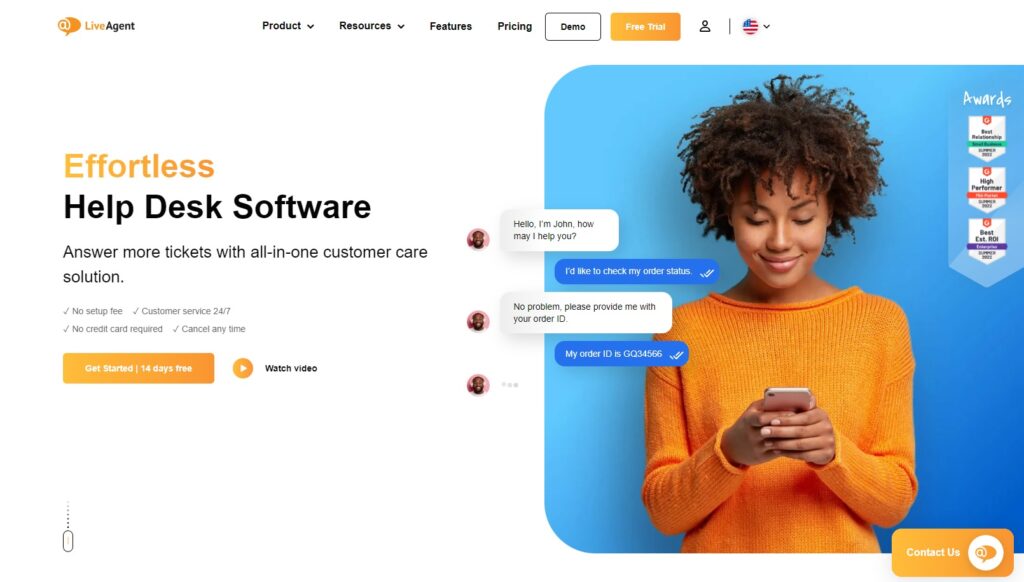
LiveAgent’s key features
- Ticketing system
- Assign and transfer tickets
- Automated ticket distribution
- Time tracking
- Chat distribution
- Task distribution
- Internal chat & calls
- Agent availability
- Analytics overview
- Performance report
- Department report
- Benchmarks and leaderboards
- Language adaptable widgets
- Knowledge base management
Key integrations
- API
- Shopify
- CMS systems
- CRM systems
- Collaboration tools
- Migration plugins
- HubSpot
- Magento
- VoIP
- Project management
- iCloud
- Gmail
- Slack
- Google Calendar
- Social media
Pros
- Improves the productivity of customer support
- Organized interface
- Many available integrations
- Extensive features and functionalities
Cons
- Due to its complexity, it may take time to master
- Add some customization options
Best for businesses of all sizes
LiveAgent is a highly scalable and versatile tool that can be beneficial for companies of all sizes that prioritize excellent customer service and need to manage a high volume of customer inquiries. Additionally, LiveAgent is an excellent choice for businesses that want to streamline their support processes and save time and resources by automating repetitive tasks. It is a great choice for on-premise and remote teams alike.
LiveAgent pricing
- Free trial: YES
- Free: You can use LiveAgent for free, however, it includes limited basic features. If you would like to experience more advanced features, consider opting for one of the other pricing plans.
- Small: $9 per agent per month
- Medium: $29 per agent per month
- Large: $49 per agent per month
- Enterprise: $69 per agent per month
You can migrate all your data from your current provider into LiveAgent with one of our pre-built plugins, or you can reach out to our technical support specialists and let us know what type of migration you require. Our agents will happily assist you and do all the hard work for you.
2. Trello
Trello is a simple yet powerful tool that brings all your tasks and tools together. If you want to uphold team transparency, Trello may be a good option to consider.
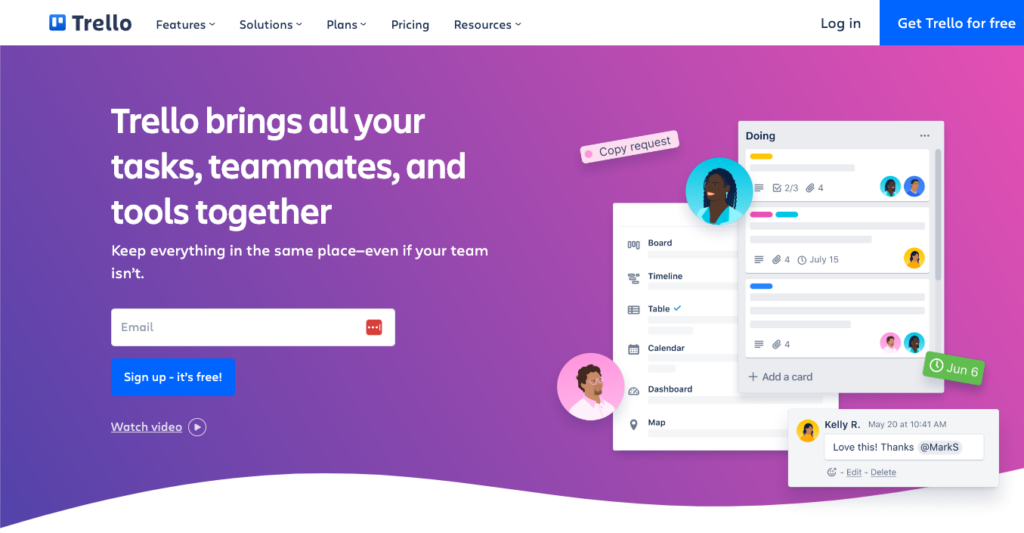
Trello’s key features
- Trello planning board
- Timeline
- Insights through custom dashboard
- Create multiple planning boards
- Intelligent automation tips
- Calendar
- Table view
Key integrations
- Slack
- Jira Software
- Google Calendar
- WebWork Time Tracker
- Freshdesk
- GitHub
- Clockify
- HelpScout
- Mailchimp
Pros
- Task management
- Notifications about real-time updates
- Team communication
Cons
- Clunky integration with Google calendar
- Interface on mobile version
Best for businesses of all sizes
Trello is a popular choice for businesses of all sizes that need help managing their projects. Trello’s free and affordable pricing plans make it a great choice for startups and small businesses that need a cost-effective solution. However, thanks to its advanced features, Trello is also a suitable alternative for larger team sizes that need to manage complex projects.
Trello pricing
- Free trial: YES (only for Premium plan)
- Free: $0 for the whole team
- Standard plan: $5 per user/month if billed annually
- Premium plan: $10 per user/month if billed annually
- Enterprise: $17.50 per user/month if billed annually (contact sales)
3. LiquidPlanner
LiquidPlanner is a project management solution that can dynamically adapt to changes and it can help your team to plan, predict, and perform more efficiently.

LiquidPlanner’s key features
- Predictive scheduling
- Workload views
- Priority-based planning
- Ranged estimation
- Task management
- Time management
- Intelligent insights
- Data customization
Key integrations
LiquidPlanner offers integrations with Box, Google Drive, and Dropbox. Other integrations can be built via their Open API or Zapier.
Pros
- Simple user interface
- Priority-based planning
Cons
- Difficult to use on mobile devices
- Reporting can be difficult to manage
Best for small to medium-sized businesses
LiquidPlanner is mostly beneficial for small to medium-sized businesses because of its affordability and scalability. It offers a user-friendly interface, customizable workflows, and real-time reporting and data analytics that make it easy for teams to track their project progress, manage resources, and deliver projects within deadline and budget.
LiquidPlanner pricing
- Free trial: YES
- Free plan: limited to 3 users, 6 resources, 10 projects, and 300 tasks
- Essentials: $15 per user/month with annual billing
- Professional: $25 per user/month with annual billing
- Ultimate: $35 per user/month with annual billing
4. Assembla
Assembla offers a complete suite of project and program management tools. It offers two solutions that meet the needs of different team sizes, from 5 up to 5,000 users.
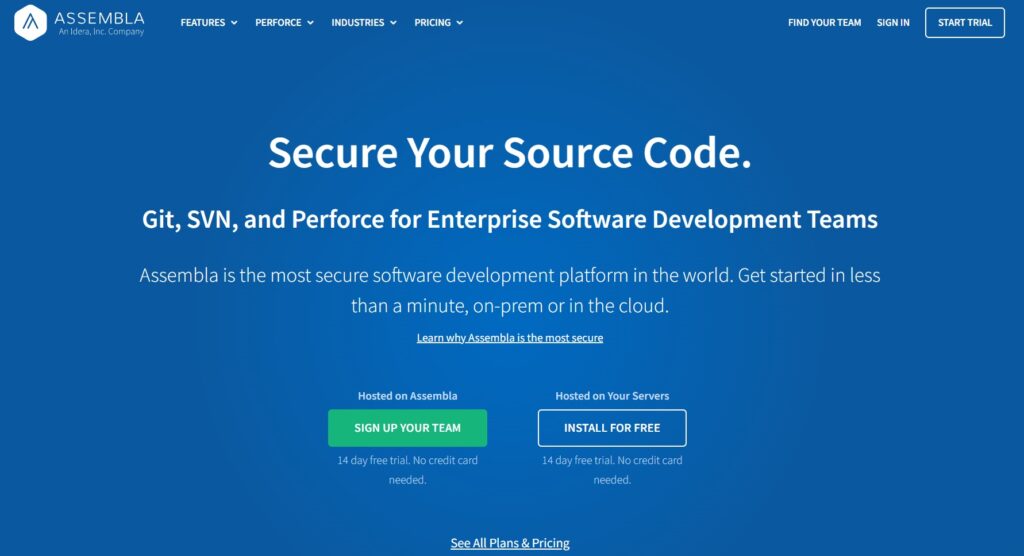
Assembla’s key features
- Task boards
- Cardwalls
- Task management
- Ticket views
- Milestones
- iOS app
- Gantt charts
- Backlog management
Key integrations
- Google Drive
- Gmail
- Slack
- Trello
- Dropbox Business
- GitHub
- Jira software
- Zapier
- Meta for Business
Pros
- Real-time reports
- Ability to escalate and prioritize tasks
Cons
- Mobile application
- Steep learning curve
- Insufficient customer support
Best for businesses of all sizes
Assembla is a versatile tool ideal for software development, IT, marketing, and creative teams of all sizes. It is scalable and customizable to fit the needs of any company, from small startups to large enterprises.
Assembla pricing
- Free trial: YES
- Assembla Cloud Starter: $12 per user/month
- Assembla Cloud Pro: $19 per user/month
- Assembla Cloud Enterprise: Custom
- Perforce Cloud Pro: $52.25 per user/month 12-month term
- Perforce Cloud Enterprise: Custom
5. Asana
Asana is an easy-to-use and flexible tool that will help improve efficiency across your organization. It supports an entire team collaboration and helps maintain transparency within your business.
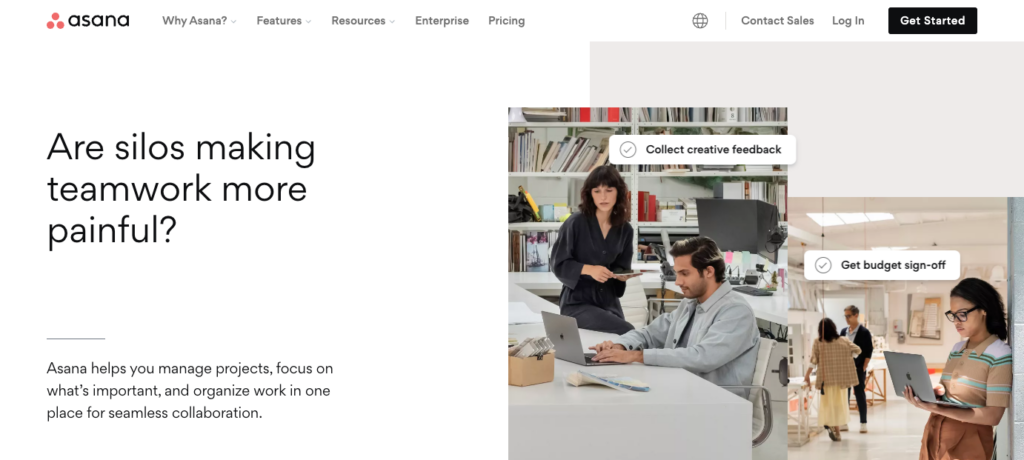
Asana’s key features
- Create tasks and subtasks
- Create milestones
- Task distribution
- Time tracking
- Project overview
- Timeline
- Custom Dashboards
- Permissions and privacy control
- Team management
- Team conversations
Key integrations
- Slack
- Microsoft Teams
- Google Drive
- Vimeo
- Canva
- One Drive
- YouTube
- Dropbox
Pros
- Mobile platform
- Managing tasks and tracking progress
- Notification system
Cons
- The interface could be more intuitive
- The ability to customize notifications
Best for businesses of all sizes
Asana is a suitable tool for businesses of all sizes and industries. It offers a wide range of features that make it easy for businesses to manage their workflows, tasks, and entire projects in an effective way. Different collaboration features, such as comments, mentions, and shared projects, make it easy for teams to communicate and work together on projects in real time.
Asana pricing
- Free trial: YES
- Basic plan: €0
- Premium: €10.99 per user/month, billed annually
- Business: €24.99 per user/month, billed annually
- Enterprise: Contact sales for a quote
6. Monday.com
If you want to boost your team’s efficiency and productivity, you can do so by implementing Monday.com into your business. It will allow you to collaborate with your team and get a clear picture of all your work.
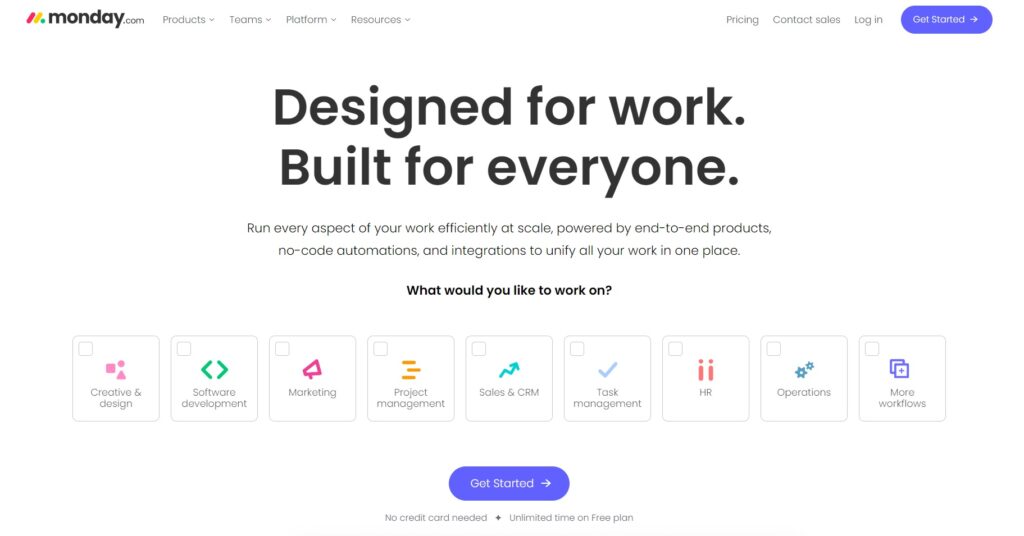
Monday.com’s key features
- Real-time collaboration
- Campaigns dashboard
- Custom dashboard
- Visual planning board
- Access control
- Co-edit in real time
- Weekly tasks and checklists
- Tagging team members
- Real-time updates
- Editor
Key integrations
- Outlook
- Microsoft Teams
- Slack
- Dropbox
- Zoom
- Excel
- Project management tools
- CRM
- Software development tools
Pros
- Intuitive interface
- Tracking the progress
- Notification system
Cons
- High price
- Limited reporting options
Best for businesses of all sizes
Monday.com is an intuitive project management platform that offers a flexible tool that is suitable for businesses of all sizes. Monday.com is a scalable solution that can easily adapt to the growing needs and requirements of businesses in various industries.
Monday.com pricing
- Free trial: YES (only for Pro plan)
- Free: €0
- Basic: €8 per seat /month
- Standard: €10 per seat /month
- Pro: €16 per seat /month
- Enterprise: Contact sales
7. ClickUp
Simplify your work and get more done by using ClickUp. It allows you to plan, track, and manage your work and projects. ClickUp’s customizable features and automation capabilities make it a good option for businesses that need to manage their workflows effectively.
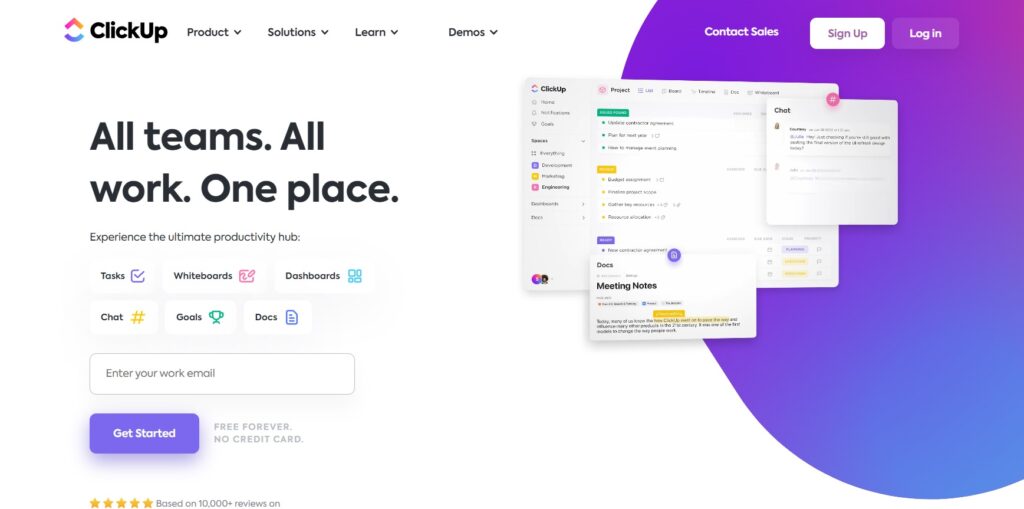
ClickUp’s key features
- Customizable tasks
- Create subtasks and checklists
- ClickApps
- Automations
- Project templates
- Task management
- Real-time reports
- Project goals and milestones
- Time tracking
- Detailed reporting
Key integrations
- LiveAgent
- Slack
- Google Drive
- Dropbox
- Outlook
- Google Calendar
- YouTube
- Zoom
- Amazon Alexa
- Microsoft Teams
Pros
- Simple and intuitive interface
- Task prioritization
- Real-time dashboard
Cons
- Time tracker and reports are difficult to use
- Could use more customization in custom reports
Best for businesses of all sizes
ClickUp is an all-in-one project management tool that provides a comprehensive solution for businesses of all sizes. ClickUp’s free and affordable pricing options make it an ideal choice even for smaller businesses that require a cost-effective solution.
ClickUp pricing
- Free trial: NO
- Free: $0
- Unlimited: from $5 per member/month
- Business plan: from $12 per member/month
- Business Plus: from $19 per member/month
- Enterprise: Contact sales
8. Quickbase
Quickbase is a no-code platform that lets businesses easily build custom applications without any coding experience. It also allows them to connect and customize enterprise applications that fix workflow gaps to improve efficiency in their organization.

QuickBase’s key features
- No-code development
- Workflow automation
- Real-time insights
- Transform data
- Change schema
- Manage complex projects
- Customizable dashboard
- User roles
- Advanced security controls
Key integrations
Quickbase offers 3 integration capabilities to suit different users’’ needs. The first is a visual drag-and-drop interface that allows users to create apps that integrate external data sets, regardless of their skill level. The second is a RESTful API for custom integrations. Finally, webhooks provide simple access to data stored outside of Quickbase.
Pros
- Live data tracking
- Reporting and analytical tools
Cons
- Limited customization
- Customer support
- Price
Best for businesses of all sizes
Quickbase is a valuable tool for any company that is looking to streamline their day-to-day operations, increase team productivity, and improve collaboration within the organization.
QuickBase pricing
- Free trial: YES
- Team: from $30 per user/month (minimum 20 users)
- Business: from $50 per user/month (minimum 40 users)
- Enterprise: Contact sales for more information
9. Aha!
Successful project delivery starts with a clear plan of what needs to happen and when. This is where Aha! delivers a tool that can help you build project plans and manage cross-functional work to meet your deadlines.
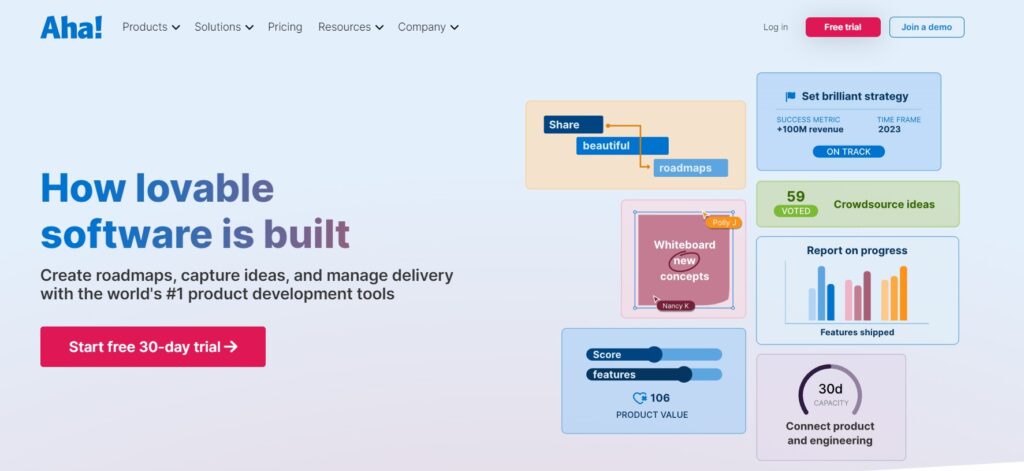
Aha!’s key features
- Create project roadmaps
- Track dependencies
- Monitor project KPIs
- Add personal and team notes
- Draft document with AI
- Calendar
- Customizable templates
- Real-time collaboration on documents
- Link strategic goals
Key integrations
- Azure DevOps
- GitLab
- Jira software
- Slack
- Microsoft Teams for Ideas
- Google Chat
- Google analytics
- Outlook
- Zapier
- Google Drive
Pros
- Roadmapping
- Great comment threads
Cons
- Notes sections
- More training material needed
- Mobile platform
Best for businesses of all sizes
Aha! Is a great solution that can benefit many companies, from small startups to large enterprises. However, it is particularly useful for companies that focus on creating and launching products, such as software development or marketing industries. It is also ideal for companies that need to align their product strategy with their business goals.
Aha! pricing
- Free trial: YES
- Aha! Develop: starts at $9 per user per month
- Aha! Notebooks: starts at $9 per user per month
- Aha! Ideas: starts at $39 per user per month
- Aha! Roadmaps: starts at $59 per user per month
10. Wrike
Wrike is an all-in-one platform that helps you manage your projects, organize work, see the project progress, and enhance collaboration across all departments.
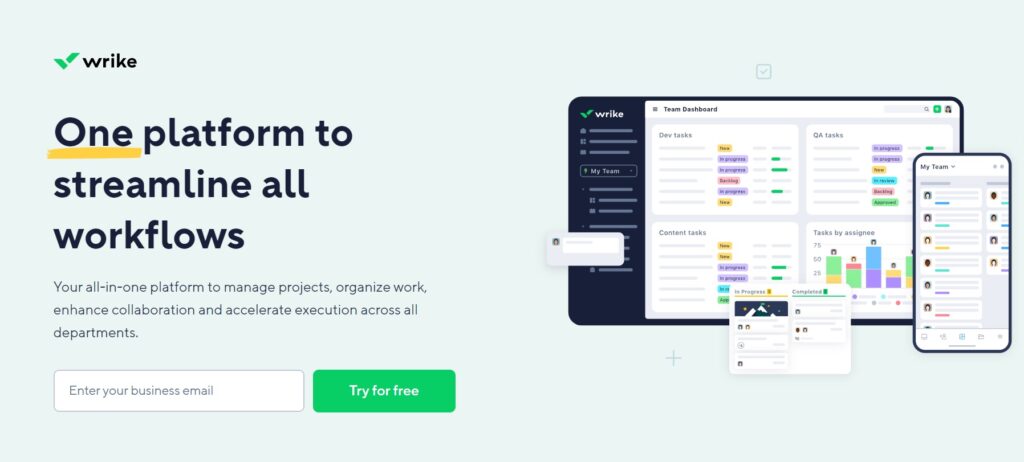
Wrike’s key features
- Create folders, projects, tasks, and subtasks
- AI work creation
- Board view
- Gantt chart
- Job roles
- Track time
- Cross-tagging
- Live document editor
- Advanced analytics
- Shareable dashboard
Key integrations
- Dropbox
- Gmail
- Google Calendar
- Google Drive
- OneDrive
- Outlook
- Salesforce
- Slack
- Shopify
- WordPress
Pros
- Project status updates
- Specific task tracking
Cons
- Steep learning curve
- The notifications could be improved
Best for businesses of all sizes
Wrike is a great choice for businesses of all sizes. From small startups to large enterprises, Wrike can help teams stay organized and focused, enabling them to deliver projects on time and within budget.
Wrike pricing
- Free trial: YES
- Free: $0
- Team: $9.80 per user per month
- Business: $24.80 per user per month
- Enterprise: Contact sales team
- Pinnacle: Contact sales team
11. GitLab
GitLab is a comprehensive DevSecOps platform that enables teams to manage their entire software development lifecycle in one place. From planning and coding to testing and deployment, GitLab provides all the necessary tools teams need to collaborate and accelerate their workflow.
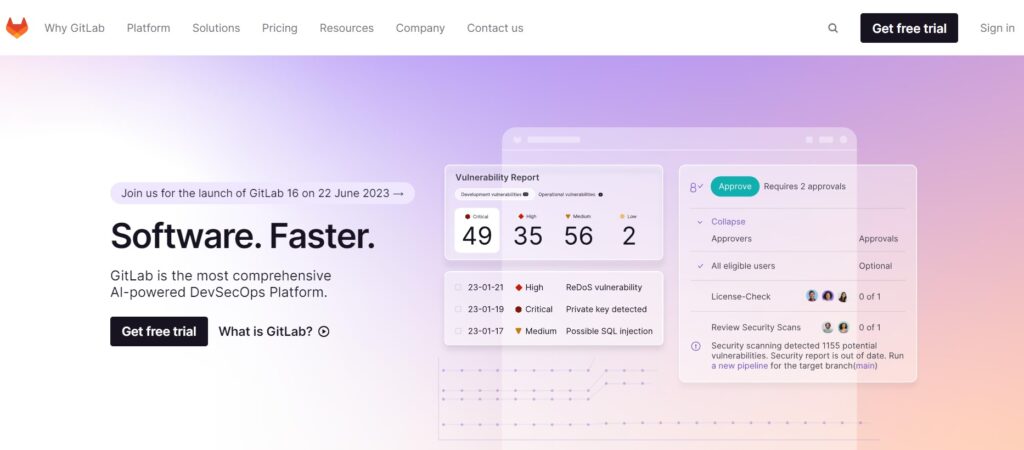
GitLab’s key features
- Bring your own GitLab CI runners
- Faster code reviews
- Advanced CI/CD
- Merge requests
- Security dashboards
- Dependency scanning
- Static application security testing
- Multi-level epics
Key integrations
- GitHub
- Google Chat
- Jira software
- Slack notifications
- Datadog
- Bugzilla
- Assembla
Pros
- Provides great user experience for developers
- Issue tracking
- Code repository
Cons
- Insufficient integration with other tools
- Lack of analytical insights
Best for businesses of all sizes
GitLab can be a great tool for companies of different sizes, as it offers a scalable and customizable solution that can be tailored to fit your specific needs. By using GitLab, teams can work more efficiently and deliver software faster, making it an essential tool for any modern software development team.
GitLab pricing
- Free trial: YES
- Free: $0
- Premium: $29 per user per month
- Ultimate: $99 per user per month
12. Redmine
Redmine is a flexible Jira open source alternative that can help you automate your processes, and assist with planning. Using the Ruby on Rails framework, it is cross-platform and cross-database.
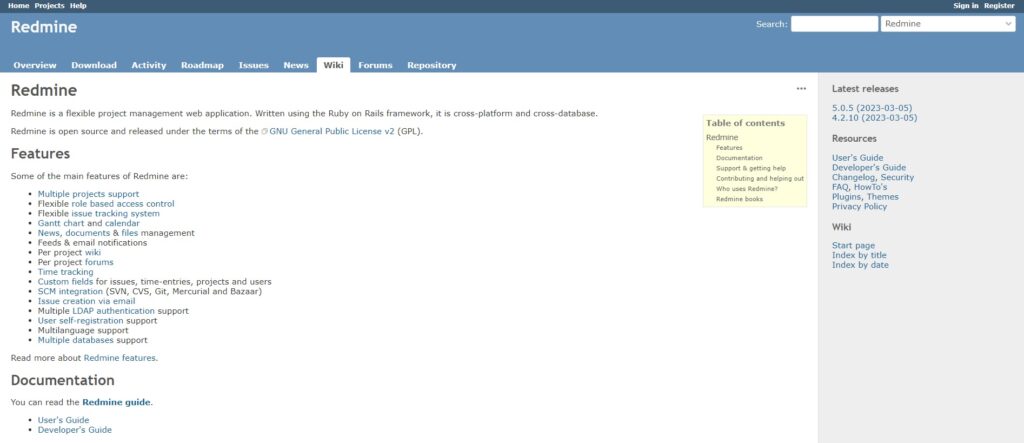
Redmine’s key features
- Flexible issue tracking
- Gantt chart
- Document and file management
- Email notifications
- Time tracking
- Custom fields
- Multi-language support
- Issue creation via email
- Calendar
- Role-based access control
- Multiple project support
Key integrations
- Zendesk Suite
- Hubstaff
- Typeform
- TimeCamp
- Aha!
- Teamwork
- OpsGenie
- Backlog
Pros
- Easy to assign tasks
- Easy to track progress
Cons
- Design and user interface
- It can be difficult to understand in the beginning
Best for businesses of all sizes
Redmine is one of the open-source Jira alternatives, and can be a good option for a wide range of companies, from small businesses to large enterprises. Companies in the software development, IT, and marketing industries can benefit the most from Redmine because it offers features that are tailored to their needs.
Redmine pricing
- Free (some plugins might require payment)
13. Notion
Notion is a powerful project planning and management tool that can help you manage any type of project, no matter how big or small your organization or team is. It provides clarity to all team members and enables them to be more efficient.
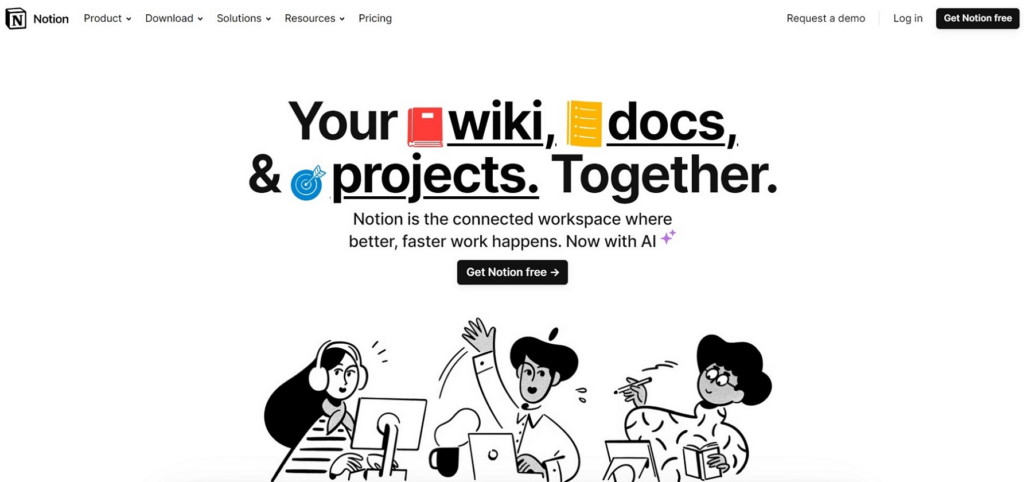
Notion’s key features
- Calendar
- Create priority labels, status tags, and more
- Customizable templates
- Bug tracking
- Bug reports
- Filter and sort information
- Status, assignee, and due date overview
- Progress bar
- Filter for “My tasks”
- Task distribution
Key integrations
- GitHub
- Slack
- Zapier
- Trello
- Google Drive
- Zoom
- OneDrive
Pros
- Easy to use
- Available for multiple devices (mobile, desktop, etc.)
- Team collaboration
Cons
- More information on how to use new features
- Add more integrations
Best for businesses of all sizes
Notion offers an intuitive interface and robust features that make it a great choice for companies of all sizes, as it can help their teams collaborate more effectively and streamline their workflows.
Notion pricing
- Free trial: YES
- Free: $0
- Plus: $8 per user/month billed annually
- Business: $15 per user/month billed annually
- Enterprise: Contact sales team
14. GitHub
GitHub is a platform designed for developers and project managers to share and collaborate on software projects. It allows its users to store code, track changes, view project progress, and manage versions of their projects.

GitHub’s key features
- Create customized view of your issues
- Organize and prioritize your tasks
- Create milestones
- Charts and insights
- Wikis
- Create teams
- Custom roles
- Custom repository roles
- Domain verification
- 2FA
- Notifications
Key integrations
GitHub gives users the option to install integrations either in their personal accounts or in the organizations they own. Additionally, they can install third-party apps in a specific repository where they have admin permissions or in repositories owned by their organization.
Pros
- Code reviews
- Integration with external tools
- Version control
Cons
- Navigating GitHub can be confusing in the beginning
- Limited storage space
Best for businesses of all sizes
Companies of all sizes and types can benefit from using GitHub. However, it is particularly valuable for software development teams. Smaller businesses can use GitHub to efficiently manage code and collaborate on their projects, while larger enterprises can use it to streamline development workflows and improve team collaboration.
GitHub pricing
- Free trial: YES (only for Enterprise plan)
- Free
- Team: $3.67 per user per month (for the first 12 months)
- Enterprise: $19.25 per user per month (for the first 12 months)
15. Basecamp
Basecamp is an all-in-one solution that offers a unique set of tools and methods to make project planning and management easier and less of a chore.
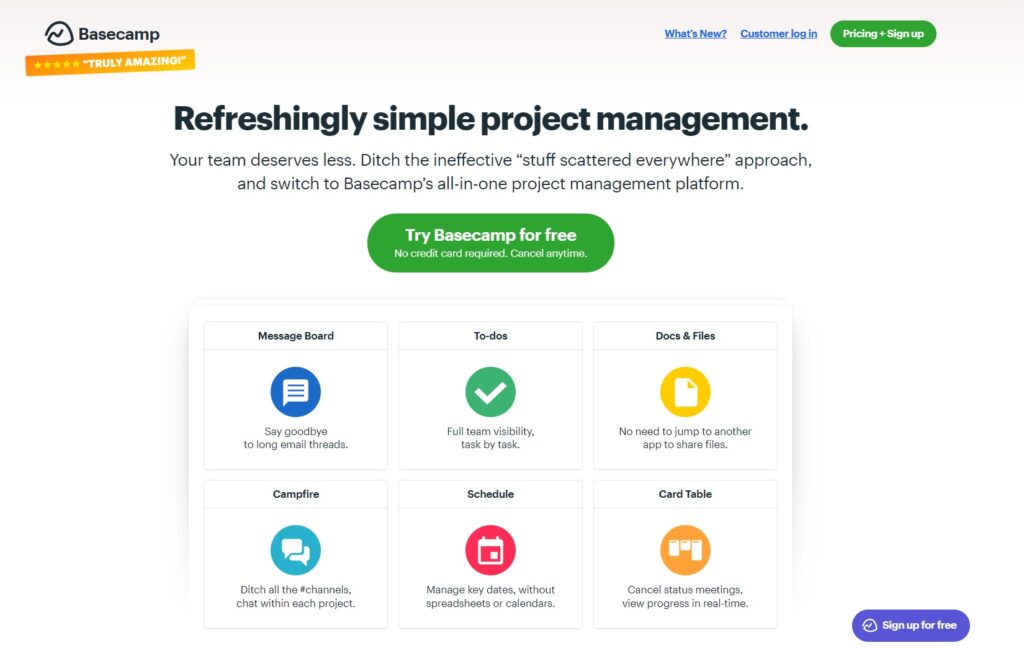
Basecamp’s key features
- Message board
- To-do lists
- Document and file sharing
- Scheduling
- Real-time progress view
- Real-time group chats
- Hill charts
- Notifications
Key integrations
- Mobile and desktop app integrations
- Time tracking integrations
- Accounting integrations
- Reporting and planning integrations
- Software development integrations
Pros
- Task management
- Internal communication
- Intuitive interface
Cons
- Unintuitive permission controls
- Lacks customization options
Best for businesses of all sizes
Basecamp is a scalable tool that can easily adapt to the unique needs of businesses of different sizes and in various industries, providing an efficient solution for agile project management and team collaboration.
Basecamp pricing
- Free trial: YES
- Basecamp: $15 per user per month
- Basecamp Pro Unlimited: $299 per month, billed annually (unlimited users)
Which Jira alternatives are best suited for different industries?
If you are wondering which Jira alternatives are best suited for a particular industry, in this section, we will explore which project management tools may best fit the specific needs of various industries. No matter if you work in e-commerce, healthcare, software development, or the education industry, there are tools that can be beneficial to each of them.
E-commerce and retail industry
The e-commerce and retail industries have specific needs and requirements for project management tools. These requirements may include inventory management, customer relationship management, live chat support, order tracking, team collaboration, and data analysis and reporting. Being able to meet these requirements is crucial for streamlining their daily tasks, improving team efficiency, and remaining competitive on the market.
These are the most suitable Jira alternatives that can satisfy the unique needs of an e-commerce or retail company:
- LiveAgent – LiveAgent’s comprehensive help desk software with project management capabilities is a great Jira alternative for retail and ecommerce. It can help your entire team with handling customer inquiries, tracking performance, and provide useful analytics.
- Asana – Asana is a great alternative due to its user-friendly interface and project management features that allow teams to track tasks and workflow in a simple and organized way.
- Trello – Trello is another great Jira replacement for these types of businesses because of its visual approach to project management, allowing teams to easily track project progress and collaborate in real-time on tasks and projects.
- Wrike – Wrike offers robust project management features, including time tracking and reporting, which are essential for teams in these industries to stay on top of their projects and deadlines.
Healthcare and medical services industry
Healthcare and medical organizations face unique challenges and demands that require project management software to be compliant with regulations, facilitate collaboration between medical teams, track patient care, manage resources, and provide reporting and analytics.
- LiveAgent – LiveAgent’s comprehensive help desk software with project management capabilities is a great Jira alternative for retail and e-commerce. It can help your entire team with handling customer inquiries, tracking performance, and providing useful analytics.
- Monday.com – Monday.com can be a good option for the healthcare industry and medical services organizations because of its versatility and customization options. It offers features such as task management or time tracking that make complex workflow management easier. Additionally, Monday.com’s automation features can help streamline repetitive tasks, such as appointment scheduling and patient follow-ups.
- ClickUp – ClickUp offers many suitable features that make it easy to manage complex projects. ClickUp’s custom fields and views enable teams to tailor their project workflow management to their specific needs. ClickUp also offers automation features to help streamline repetitive tasks.
- Basecamp – Basecamp is a suitable option because of its simple and intuitive interface. Basecamp offers features such as task management, file sharing, and calendar integration that can help medical teams manage patient care and administrative tasks. Basecamp’s client portal and communication tools also allow healthcare organizations to communicate and collaborate with patients and caregivers.
Software development and IT services industry
Software development and IT services businesses require project management software that meets their unique set of requirements. This includes customizable workflows, collaboration tools, the possibility to integrate with other tools, and extensive reporting and analytics to manage projects more efficiently and enhance overall productivity.
- LiveAgent – LiveAgent is a great solution for this type of industry because it provides a robust ticketing system, task management, and collaboration features. It also offers an easy-to-use platform for seamless communication via different channels. In addition, its compatibility with external tools allows teams to streamline their workflow and improve productivity. LiveAgent includes knowledge hubs, self-service options, and feedback boxes, making it a comprehensive customer support and communication solution.
- GitHub – GitHub offers powerful version control and collaboration features, allowing teams to track changes in code, manage code reviews, and collaborate on projects in real time. Additionally, GitHub’s integration with other development tools, such as Jira and Slack, makes it a suitable option for developers.
- GitLab – GitLab is another great solution due to its comprehensive DevOps platform. GitLab offers features such as continuous integration and deployment and project management, all in a single platform. This makes it easy for teams to manage their entire software development workflow in one centralized platform.
Education and training industry
These popular project management tools can help education and training institutions to improve collaboration, manage tasks, and resources, and generate custom reports. They offer customization options to meet the unique requirements of different courses, programs, and institutions, providing flexibility and scalability.
- LiveAgent – LiveAgent is a great solution that provides help desk and ticketing features, which can make it easy to manage student inquiries. Its features include automation, a knowledge base, chat, and social media integration, among many others. These features can improve student support, track issues, and resolve problems in a timely manner.
- Trello – Trello offers a simple interface with drag-and-drop functionality to manage tasks and assignments. It also offers useful integrations with other apps such as Google Drive, Dropbox, and Slack.
- Notion – Notion is a collaborative workspace that offers features such as task management, note-taking, and database management. It offers many integrations with other apps such as Google Drive, Trello, or Slack. Notion can be used for a variety of purposes like managing course materials, tracking student progress, and collaborating with team members.
Conduct a trial run or demo before committing
Before you decide to commit to any of these project management tools, make sure you conduct a trial run or a demo call. It can be beneficial for several different reasons:
Firstly, it allows you to try different features, see how it works in practice, how easy or difficult it is to navigate, and how it integrates with other tools. You will get a feel for the software and see if it meets your specific needs before purchasing.
Another reason is that it allows you to compare various options and find the best fit for your business and your team. You will be able to compare features, pricing plans, customer support, its usability, and more. A trial run or demo can also help you to identify any potential issues or limitations of the software. Users can test it out with their own data to see if it is suitable for their needs. Keep in mind that sometimes helpdesk software free of charge can be just enough to meet your needs.
Conclusion
To sum it up, there are many different Jira alternatives available, each offering a unique set of features and capabilities tailored to different businesses and industries. When choosing the right project management software for your business, take into consideration factors such as scalability, ease of use, integration capabilities, collaboration tools, and pricing to ensure that the solution aligns with your specific needs and requirements.
Some potential reasons for seeking an alternative include the need for a more user-friendly interface, better collaboration tools, easier task tracking, or more affordable pricing. By understanding your specific needs, you can make an informed decision and choose the best project management software that will streamline your daily tasks and enhance your team’s productivity.
LiveAgent could be a great solution for businesses that are looking to improve their internal and external collaboration and streamline communication with customers. With features such as a ticketing system, live chat, call center, and social media integrations, LiveAgent offers an all-in-one solution that can help teams manage customer inquiries more efficiently. Its task management and seamless integration with other third-party tools enhance productivity and workflow. With a user-friendly interface and affordable pricing options, LiveAgent is worth considering as a Jira alternative.
However, in order to find the perfect alternative for your business, start by identifying your team’s needs, existing pain points, and desired improvements. It may also be helpful to take advantage of free trials or demos to gain firsthand experience with each platform.
Are you ready to streamline your communication and elevate your customer support? Sign up for our free trial today, and experience its powerful features firsthand!

 Български
Български  Čeština
Čeština  Dansk
Dansk  Deutsch
Deutsch  Eesti
Eesti  Español
Español  Français
Français  Ελληνικα
Ελληνικα  Hrvatski
Hrvatski  Italiano
Italiano  Latviešu
Latviešu  Lietuviškai
Lietuviškai  Magyar
Magyar  Nederlands
Nederlands  Norsk bokmål
Norsk bokmål  Polski
Polski  Română
Română  Русский
Русский  Slovenčina
Slovenčina  Slovenščina
Slovenščina  简体中文
简体中文  Tagalog
Tagalog  Tiếng Việt
Tiếng Việt  العربية
العربية  Português
Português 




